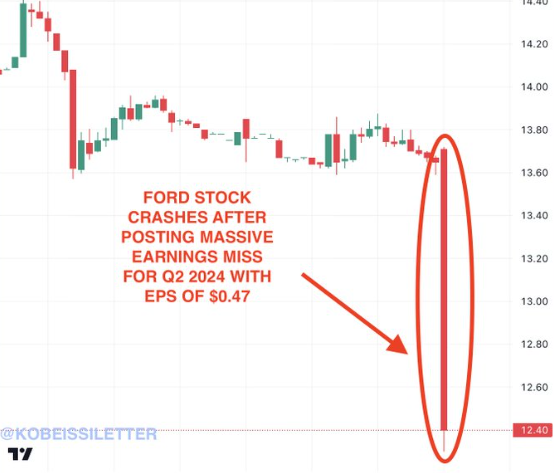Between quality issues and the foolish effort to face off against Elon Musk, Ford is not doing well, along with the other American car companies.
Ford Motor reported a significant drop in adjusted profit for the second quarter, highlighting ongoing struggles with costly quality problems and a challenging electric vehicle (EV) market. The automaker’s shares fell by 11% in after-hours trading following the announcement. Ford’s adjusted profit per share came in at 47 cents, missing analysts’ expectations of 68 cents, as reported by LSEG.
BREAKING: Ford stock, $F, falls over 10% on the day after posting a massive earnings miss.
Ford reported EPS of $0.47 which was a whopping 31% below expectations of $0.68.
Ford also posted $44.0 billion of Automotive revenue, below expectations of $44.8 billion.
Warranty… pic.twitter.com/N706xbNfUz
— The Kobeissi Letter (@KobeissiLetter) July 24, 2024
Executives at Ford emphasized the company’s ongoing efforts to eliminate structural inefficiencies and revamp both its traditional gas-engine and EV operations. However, these reassurances failed to convince investors. During a conference call, Morgan Stanley analyst Adam Jonas questioned Ford CEO Jim Farley about the company’s transformation, noting a disconnect between Ford’s internal progress and its market perception.
Since taking the helm in October 2020, Farley has prioritized addressing Ford’s quality issues. The company hired a new executive director of quality and implemented changes in its production practices. Despite these efforts, Ford continues to lead the industry in recalls. In the second quarter alone, warranty expenses increased by $800 million compared to the previous quarter, mostly tied to older vehicles released before 2021. Ford’s Finance Chief, John Lawler, noted that these expenses were a one-time cost and that the company expects warranty costs to stabilize in the second half of the year.
Despite the quarterly challenges, Ford maintained its annual guidance, projecting earnings before interest and taxes to be between $10 billion and $12 billion. Lawler reassured that the company is not derailed and remains confident in its overall strategy, acknowledging that the transformation will include some setbacks.
BREAKING: FORD just released 2Q earnings revealing EV revenue of $1.1B (-37% yoy) and EV losses of $1.2B.
Outlook: Ford raises FCF guidance by +$1B (to $7.5-8.5B)
I’ll follow up with a deep dive. pic.twitter.com/BQgzzQWhid
— AJ (@alojoh) July 24, 2024
Ford’s EV ambitions have faced headwinds amid softening demand, a shift towards hybrids, and strong competition from Tesla and Chinese manufacturers. The company recently adjusted plans for a Canadian assembly plant, opting to produce its popular F-150 pickups instead of a previously planned three-row EV. Farley acknowledged the company’s struggle to meet the high demand for these traditional trucks, but expressed optimism about Ford’s long-term prospects.
On the EV front, Ford recorded a $1.1 billion operating loss in the second quarter, following a $1.3 billion loss in the first quarter. The company anticipates a pretax loss of up to $5.5 billion for the year in its EV and software division. Nevertheless, Ford is increasing its focus on expanding its global hybrid portfolio by 40% this year and is developing a platform for affordable, smaller electric vehicles.
Despite the challenges, Ford’s commercial vehicle segment, described by Farley as the company’s “secret weapon,” delivered strong results. The segment posted an operating profit of $2.6 billion with a 15% operating margin for the quarter.
NEWS: Ford’s EV unit reported Q2 revenue of $1.1 billion and a loss of -$1.1 billion.
• EV vehicle volume: -23%
• EV revenue: -37%
• Q2 EV EBIT margin of negative -99.5% pic.twitter.com/ox3tt9ueUL— Sawyer Merritt (@SawyerMerritt) July 24, 2024
Meanwhile, General Motors, Ford’s crosstown rival, reported better-than-expected profit and revenue for the second quarter, driven by strong demand and pricing for gas-powered trucks. However, GM’s stock also faced a decline, reflecting broader concerns about the sustainability of the auto industry’s current resilience.
Major Points:
- Ford’s Q2 earnings dropped significantly due to quality issues and EV sector challenges.
- Adjusted profit per share fell short of expectations, causing a sharp decline in stock value.
- CEO Jim Farley emphasized ongoing efforts to tackle structural inefficiencies and quality problems.
- Despite a tough quarter, Ford maintained its annual earnings forecast.
- The commercial vehicle segment remained a key profit driver for Ford.
James Kravitz – Reprinted with permission of Whatfinger News



